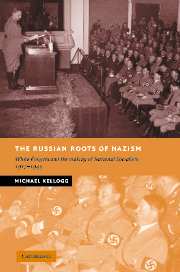Book contents
- Frontmatter
- Contents
- Acknowledgments
- List of abbreviations
- Introduction
- 1 The far right in the German and Russian Empires
- 2 At the extreme in the Ukraine and in Germany
- 3 “Hand in hand with Germany”
- 4 The international radical right's Aufbau (reconstruction)
- 5 “Germany–Russia above everything”
- 6 Conspiracies of fire and the sword
- 7 “In Quick March to the Abyss!”
- 8 The four writers of the apocalypse
- 9 Aufbau's legacy to National Socialism
- Conclusion
- Bibliography
- Index
- NEW STUDIES IN EUROPEAN HISTORY
8 - The four writers of the apocalypse
Published online by Cambridge University Press: 23 July 2009
- Frontmatter
- Contents
- Acknowledgments
- List of abbreviations
- Introduction
- 1 The far right in the German and Russian Empires
- 2 At the extreme in the Ukraine and in Germany
- 3 “Hand in hand with Germany”
- 4 The international radical right's Aufbau (reconstruction)
- 5 “Germany–Russia above everything”
- 6 Conspiracies of fire and the sword
- 7 “In Quick March to the Abyss!”
- 8 The four writers of the apocalypse
- 9 Aufbau's legacy to National Socialism
- Conclusion
- Bibliography
- Index
- NEW STUDIES IN EUROPEAN HISTORY
Summary
The early National Socialist preoccupation with the “Jewish Bolshevik” peril manifested itself in the lead article of a July 1922 edition of the Party newspaper the Völkischer Beobachter (Völkisch Observer). This essay asserted that the National Socialist movement had begun by warning: “Germany is rushing towards Bolshevism with giant strides.” The article, signed by the “Party leadership,” asked, “Do you want to wait until, as in Russia, a Bolshevik murder squad comes into operation in every city and bumps off everyone who does not want to bow to the Jewish dictatorship as a ‘counter-revolutionary?’” The Party leadership stressed that this and worse would “occur with the same methodicalness as in Russia” unless the Germans realized that “one has to fight now if one wants to live.” Resistance to “Jewish Bolshevism,” cast in terms of a life and death struggle, formed a central tenet of early National Socialist ideology.
In his book The Occult Establishment, the historian James Webb asserts that exiled “Russian idealists” served “as witnesses to the national tragedy and reminders of the insecurity which also troubled the West; as bearers of an illuminated culture that was preoccupied with Apocalypse; and as carriers of the plague of conspiracy-theory politics.” Webb correctly assesses the destabilizing influence of Russian expatriates. Several White émigrés significantly affected the virulently anti-Bolshevik and anti-Semitic National Socialist Weltanschauung. Adolf Hitler, who only began to develop strong anti-Bolshevik and anti-Semitic views in the second half of 1919, learned extensively from some White émigrés.
- Type
- Chapter
- Information
- The Russian Roots of NazismWhite Émigrés and the Making of National Socialism, 1917–1945, pp. 217 - 244Publisher: Cambridge University PressPrint publication year: 2005



